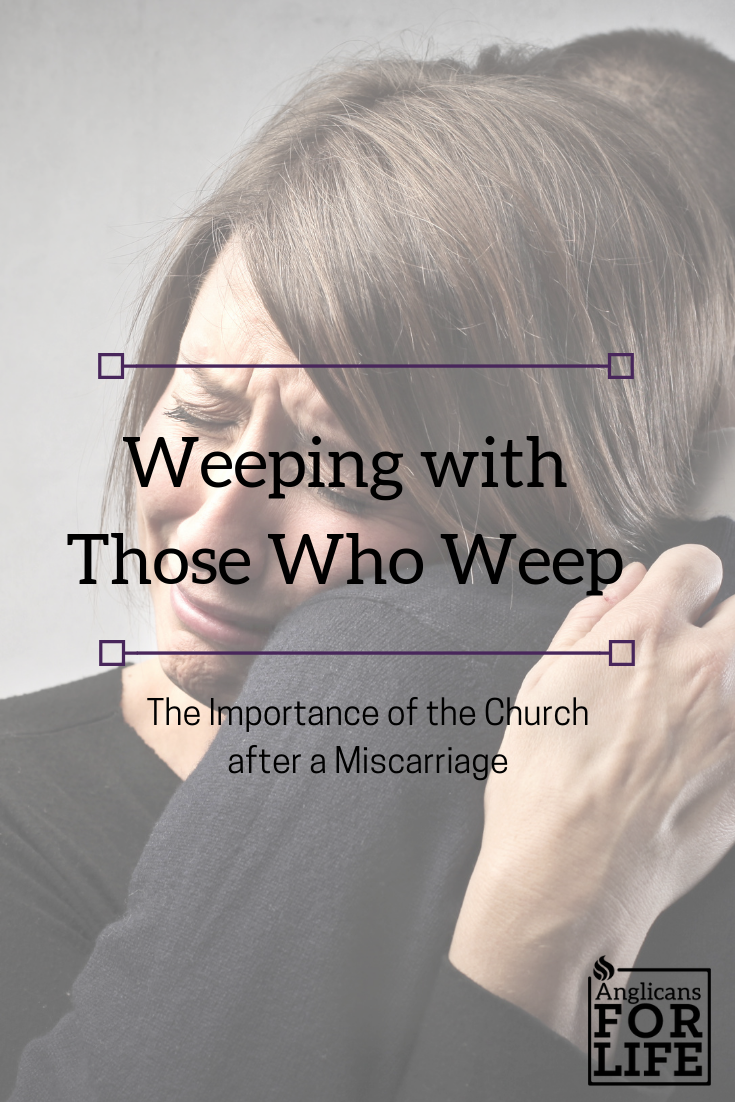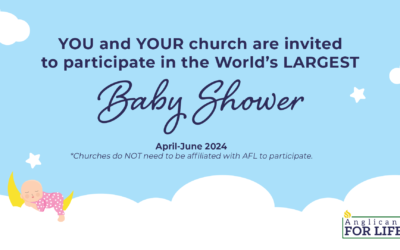Last summer, Rev. Tish Warren contacted Anglicans for Life. Talking with clergy is nothing new in this office, but what she wanted to discuss was deeply painful and personal. She had lost her 14-week old son in a miscarriage and wanted to claim his remains from the hospital and honor his short life. Could we help? AFL President Georgette Forney called her back and began helping her and her husband with the process of obtaining his remains, contacting a funeral home, and grieving. Rev. Warren shared about her experience in an article in Christianity Today and how important it was for both she and her family that AFL and her church could help them honor his life.
But Rev. Warren’s s tory also begs the question—how do we as the Church respond to a couple who have experienced miscarriage? We are very good at celebrating the birth of babies, but how often have you seen your church honor the life of a child lost to miscarriage? Not often, I suspect.
tory also begs the question—how do we as the Church respond to a couple who have experienced miscarriage? We are very good at celebrating the birth of babies, but how often have you seen your church honor the life of a child lost to miscarriage? Not often, I suspect.
And this is a shame, because miscarriage is much more common than we think it is. Although estimates vary, 1 in 4 recognized pregnancies, defined as when women are aware that they are pregnant, end in miscarriage, and 75% of those are in the first trimester. So the question becomes not if you know someone, but how many women and men you know that have experienced one or more miscarriages.
In addition to not being aware of how common it is, people also struggle to know what to say after a friend or family member experiences a miscarriage. Either they will avoid the topic or provide some unhelpful platitudes (the last resource is not from a Christian website, but does provide some helpful guidelines on what not to say to someone who has experienced a miscarriage). Because, let’s be honest, it is much easier to talk about babies and pregnancy and much more difficult to talk about the grief of losing a child. People in the Church usually aren’t intentionally unkind or dismissive. They just aren’t sure what to say.
So a combination of our natural awkwardness about the topic, fear of causing hurt, and lack of awareness of the commonness of miscarriage unfortunately results in something worse than well-meant but badly delivered clichés—silence. Are you struggling to think of more than a small handful of people you know who have experienced miscarriage? There is definitely a reason for that. I have known a few couples in my church to have experienced a miscarriage, but what I remember most are the whispered conversations and sad headshakes directed at shaken, grieving couples. I suspect many women and men who experience miscarriage would rather not be objects of distant pity or unhelpful scrutiny.
And I want to be clear here. Not everyone grieves the same way, and not all couples need or want their loss to be grieved openly. Some would prefer to keep the news of the pregnancy and miscarriage within a small circle of family and friends. But when we create an atmosphere, especially in our churches, in which expressing grief over miscarriage is somehow not allowed or frowned upon, we have failed as the Church. We are told in Romans 12:15 to rejoice with those who rejoice—but also to weep with those who weep.
So how should the Church respond? Talk with couples and pray with them. Ask how they are, in the weeks and even months after the miscarriage, and let them know that it’s okay to be sad, even for a longer time than what some people think is “normal”. Talk to them about how your church can help them honor their children and their loss.
Why does the Church’s witness matter so particularly here? If the Church claims that life begins with conception and that all lives matter, not honoring children who are miscarried makes the Church’s stance on the Sanctity of Life inconsistent at best and insincere at worst. In a world full of contradictions, where society can offer condolences after a miscarriage but celebrate the abortion of a “fetus” of the same age and development as a triumph for female autonomy and human rights, the Church’s voice and actions matter. Because if parents can grieve the loss of a miscarried child, a unique person, and the Church can acknowledge this loss, does this not bring with it the knowledge that all children in the womb are worthy of being honored?
So, Church, don’t allow awkwardness to stop you from speaking with grieving families in sympathy and understanding. Comfort those who need comfort. May we be a Church that rejoices in life and mourns the lives—however short—that have been lost.
by AFL Administrator Robin Ferguson
If you have experienced miscarriage or infant death or know someone who has, an excellent resource is A Precious Loss by Sharon Fox. The book designed to provide insight into the grief process and offers suggestion for concrete coping methods which will lead to contentment.



